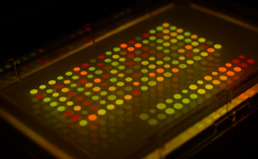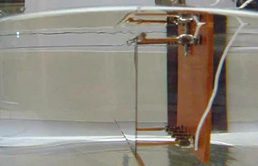Podcast for 20 January 2012
ANIMALS & PEOPLE - Levitating flies, what dogs and babies have in common, how oxytocin makes kinder, gentler monkeys, a fish that mimics an octopus that mimics a fish, and how bats hear with both sides of the brain.


ANIMALS & PEOPLE - Levitating flies, what dogs and babies have in common, how oxytocin makes kinder, gentler monkeys, a fish that mimics an octopus that mimics a fish, and how bats hear with both sides of the brain.
Computer scientists have developed a mathematical model to predict a drug’s side-effects before they can harm patients.

DRUGS & ROCK 'N ROLL - Predicting drug side-effects before they can harm patients. A blood test for antidepressant effectiveness. Is 27 really an unlucky number for famous musicians? Are collecting and hoarding related? And why babies favor vigilante justice.
Some of the most potent antibiotics and insecticides come from animals. Researchers have identified some promising new candidates, derived from ants and frogs.
New fabric coatings could allow clothes to clean and disinfect themselves simply by hanging out in the sun.
Researchers have created a combination of fool’s gold and silicon that could be used to make inexpensive solar cells.
Drying polyester clothing in a machine may contribute to plastic pollution at sea.
On a molecular level, water doesn't have to become ice until minus-55 degrees Fahrenheit.
A chemical that repels the opposite sex could be used to help control a common crop pest without the use of pesticides.

THE SCIENCE OF LIGHT & VISION - A pacemaker that restarts the heart with light, and a secret code made from fluorescent bacteria. And, could a lack of outdoor activity be making kids more nearsighted? Also: new research suggests that IQ might not be as stable as once thought.
Lab studies show how alcohol inhibits the immune system's response to an infection.

SCIENCE UNDERWATER - Why the seas of the future may belong to jellyfish, why fish tanks can be breeding grounds for aggression, how chatter between ocean bacteria contributes to climate change, and good news about sea turtles. Also, scientists unveil the first underwater cloaking device.
A new treatment may block specific allergies without disrupting other immune functions.
Advances in technology have made it possible to develop a hand-held breath test for a wide range of toxic chemicals.
The MESSENGER spacecraft is revealing new details about the tiny planet’s chemical composition.

PREVENTIVE HEALTH - Vitamin D and ethnicity, a breath test for toxins, drinking and the immune system, measuring pain in the brain, and a new weapon to combat allergic reactions.
Bigger tanks and richer environments reduce aggression in popular pet fish.
A replica of woolly mammoth blood protein may lead to treatments for hypothermia and improvements in surgery.
The specialized leaves of carnivorous pitcher plants are inspiring the next generation of super-slick materials.
If you’re wearing a gold ring, it began as a meteeorite that struck the earth billions of years ago, but vast deposits of precious metals are also hidden deep in the earth’s core.

MERCURY SPECIAL REPORT - The MESSENGER spacecraft is revealing new discoveries about the planet closest to our Sun.
NASA's MESSENGER spacecraft has identified mysterious hollows on the planet's surface.
The MESSENGER spacecraft is revealing surprising details about the origins of the planet Mercury.
